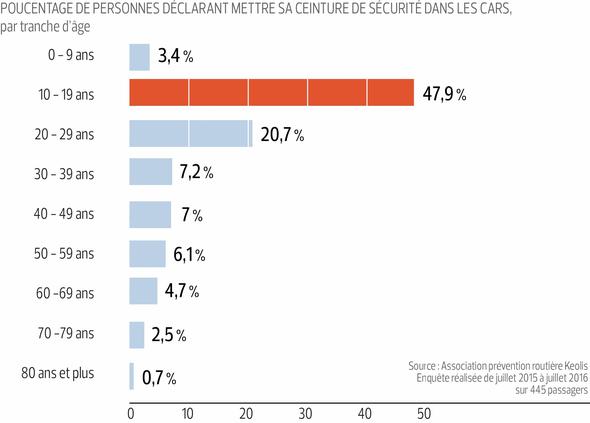One year after the compulsory wearing of belts in coaches, a study by the Road Safety Association and Keolis shows that only 16% of respondents say they “always” in focus bus. A worrying observation that caused the launch of an awareness campaign.
The belt does not appeal to most of the bus passengers. This is essentially what demonstrates an unpublished survey by the Road Safety Association and major player in the public transport in France, Keolis, one year after the entry into force of the obligation for all buses to be equipped with safety belts. The study conducted among 1,346 passengers between July 2015 and July 2016, two-thirds of users still do not attach when their bus transport. This observation prompted the two authors of the survey to launch an awareness campaign called “By bus or car, I tie my belt.”
To make travelers aware of the importance of seatbelt, two videos and a tip sheet for travelers were completed. The goal: “to convince users of the value of the belt which is essential for the proper protection of passengers’ reminds the Le Figaro Thierry Guinard, safety and environment director of the Keolis group. Because the figures are alarming. According to the survey, 65% of users do not attach, and only 16% of passengers surveyed say “always” wear the belt. “We are not completely surprised by this result,” cautions the Le Figaro Anne Lavaud, General Delegate for Road Safety.
In addition, the problem of non-wearing of seat belts is particularly visible among adolescents and young adults. Regarding the 15-19, they are only 4.6% said wearing a belt. In 20-29 years, this figure rises to 9.8%. However, Anne Lavaud, General Delegate for Road Safety, tends to qualify these figures: “There is a strong disparity between departments. In the Pas-de-Calais, 80% of users wear seat belts, but they are only 0.5% in the Oise. We note that this rate is much higher in areas where preventive measures have been carried out, particularly with school. ” This rate is in fact 100% in some school transport observed.

La belt considered ” unnecessary “
Another finding of the survey: perception of the belt remains approximate. It is often regarded as “useless” for a large number of passengers interviewed. Reached by Le Figaro , Anne Lavaud ensures that “changing behavior will take time” because until the law of 1 September 2015, the obligation was all random. A 2003 law effectively recognized the obligation of wearing seat belts in buses, but only those who possessed. Before this, he was allowed not to put on and, most often, coaches were not equipped. “The obligation of the seat belt in the front in cars, passed in 1973, has become widespread slowly. It took almost a generation for 98% of drivers exhibit this behavior. Prevention can act on users, we have the proof, “said Anne Lavaud yet.
In 2015, there were 42 deaths and 12 injuries among bus users
Since 1 September 2015, 66,000 buses that circulate in France are obliged to have seat belts. The popularity of Ouibus, set up last August, has also helped to increase public transport buses with nearly 3,000 daily departures. But if the coach left the road transport safer, it remains dangerous. In 2015, there were 42 deaths and 12 injuries among bus users following an accident. The majority of them were not wearing their seat belts, according to the National Interministerial Observatory for Road Safety.
Prevention before crackdown
If the association wants to use Road safety the full range of prevention before bidding on repression, a fine is prescribed by law. Any passenger not wearing his belt so may be fined and will have to pay a ticket for 135 euros. However, the road checks are still rare. Ultimately, therefore, the role of the driver may have to be rethought, according to Thierry Guinard. “We invite all our drivers to remember the importance of seat belt before departure. Some also go around the bus to check passengers, especially the younger ones, “he says. However, Judge Anne Lavaud “illusory” to ask the drivers for such a mission because “they need to focus on the road first.”
Another survey of this type is planned for summer 2017 or 2018. At that time, Anne Lavaud hope that the numbers will be “much better and that behaviors have changed somewhat.”
No comments:
Post a Comment